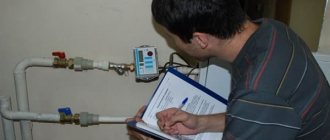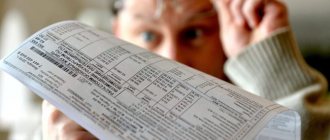What happens if you don't pay rent?
The legislation of the Russian Federation establishes the liability of property owners and social housing tenants for non-payment of utilities. The management company, municipal authorities, and the court have the right to apply enforcement measures.
Tenants of privatized housing are not responsible for non-payment, even if the contract stipulates an agreement on a monthly payment for housing and communal services. This clause of the agreement has no legal force. In case of debt, the landlord is obliged to answer by law.
Consequences
Is it possible not to pay for utilities for some time without consequences? If payment is delayed, the supplier may suspend the supply of gas, hot water, or turn off electricity. He is obliged to notify the consumer of such a measure and the reasons in writing 30 days in advance.
Important! According to the law, the management company has no right to turn off cold water and heating.
In houses built in the 70s and 80s, it is impossible to carry out the threat of turning off hot water due to common risers. Electricity and gas are turned off, sealing the closed meters and taps. In this case, an act must be drawn up, signed by the owner of the property. One copy remains with the owner, the other - in the housing and communal services. Failure or violation of the seal threatens litigation and financial losses.
The amount of material compensation is calculated by the plaintiff. It is taken into account for the period from the installation of the seal to the detection of its damage/removal, the consumption of water/gas/electricity according to the installed capacity of the equipment. Without repayment of this debt, utilities will not be restored.
As a moral influence, utility companies use the publication of the addresses and names of persistent non-payers of services. Debtors are not given certificates to obtain benefits and compensation.
Municipalities have the right to evict responsible tenants for non-payment of utilities into residential premises with a minimum area per person (6 square meters). If the occupied housing is of a similar size, then you cannot evict from it.
A way to repay the debt that suits both parties is its restructuring. The homeowner, paying monthly simultaneously for all accrued payments and part of the debt, uses all utilities. The management company receives compensation in a faster way than when going to court, where the active participation of lawyers is required.
Having debts for utilities, it is impossible to complete a purchase and sale transaction or donate real estate.
Fines
Payment for utility services is due at the end of the month, until the 10th of the next period. From this date, if funds do not arrive to the payer’s personal account, the management company has the right to charge a penalty for each overdue day. For the first two months it is 1/300 of the Central Bank refinancing rate, then 1/130.
For example: at a rate of 8% and a monthly payment of 2000 rubles, for each day an additional 0.5 ruble will be accrued on an accrual basis.
If the debt is not repaid within six months, utility companies can file a claim in court. According to the court decision, the debt must be repaid in one payment within 10 days. Otherwise, the property will be described by bailiffs and put up for sale.
If the owner has more than one apartment, then the property can be sold at auction. All income of the debtor is blocked: bank accounts, inheritance.
Judicial practice of debt collection for utility bills
For what debt does housing and communal services sue? The management company or the service provider organization can file a claim to collect debts on utility bills or file an application for a court order if the owner does not pay the receipts within 2-3 months. The cost of a lawyer's services is included in the claim.
Over what period should debts be paid? The statute of limitations for debt for utilities is in accordance with paragraph 1 of Art. 196 of the Civil Code of the Russian Federation is 3 years, that is, it is possible to collect debts that have accumulated during this time.
Judicial collection procedure. After the debtor has received the summons, he is obliged to appear in court and provide objections. If the decision is not in his favor, he can appeal it within 1 month. In most cases, a claim for collection of housing and communal services debt is satisfied in full. You can collect a debt without the participation of the owner by court order.
The court's decision. The owner must pay the funds in a lump sum or in installments according to the schedule. In court, the debt may be reduced by reducing the fine.
Enforcement proceedings. If a peaceful resolution of the issue is impossible, the case of debt for housing and communal services is transferred to the bailiffs. They initiate production:
- identify property, after the sale of which the debtor will be able to pay the debt;
- identify bank accounts that are seized;
- establish the place of work where documents are sent for retention;
- decide to ban leaving the Russian Federation.
Who can avoid paying for utilities?
Important! Certain categories of citizens, by law, may not pay for utility services or have a discount, compensation, or subsidy.
Heroes of Labor
Heroes of Labor of the Russian Federation have a 30% discount on utility bills at the federal level. Regional authorities have the right to provide an additional discount of 70%.
WWII veterans
Participants in hostilities, the siege of Leningrad, and war veterans are entitled to 50% compensation from the federal budget for paid utilities, including:
- on rent;
- water supply;
- drainage;
- electricity and gas supply.
Reimbursement of costs is determined by metering, but not higher than established consumption standards. In the absence of recording devices, the calculation is made according to the consumption standard per person.
Disabled people of groups 1 and 2
A family in which a group 1 disabled person lives has a benefit for housing and communal services: 50% compensation from the federal budget.
A disabled person of group 2 is provided with compensation for 50% of utility bills:
- for gas supply;
- water supply;
- sewerage;
- garbage removal;
- cleaning the local area;
- rent.
Compensation does not apply to family members of a group 2 disabled person.
Liquidators of the Chernobyl accident
Chernobyl victims pay 50% of the rent indicated on the receipt.
Large families
The status of a large family in different regions of the Russian Federation is interpreted differently: in some it is 3 children, in others it is 4 or 5. At the same time, consanguinity does not matter: families raising adopted children are also considered large.
At the federal level, no direct laws have been adopted to support such families in paying for housing and communal services. Support measures are determined based on Presidential Decrees, Government Decrees, and regional resolutions. Subjects of the federation are solving this problem using financial resources. For this reason, assistance in paying for utility services differs in different areas.
Families with three or more children under the age of 14-16 years can have a utility service benefit of up to 30% if they have a low income. Support is expressed in the provision of discounts and compensation.
A payment discount means a lower amount on your receipt. It does not apply to intercom services, elevator, centralized TV antenna, or current repairs at the entrance. Compensation is a refund of services previously paid in full.
In addition, parents have the right to apply for a subsidy for six months if the share of payment on UK receipts exceeds 22% of the total family income.
Find out why the debt has accumulated
Timely and full payment of housing and communal services is the responsibility of the owners of premises (Article 153 of the Housing Code of the Russian Federation). This obligation arises from the moment of registration of ownership of the premises.
Owners of apartments and non-residential premises do not always take responsibility for paying for housing and communal services. The reasons for non-payment of bills may vary. Some owners accumulate short-term debt due to the fact that they were temporarily absent from the premises and did not receive payment documents. For example, you were on a business trip or were treated in a medical facility.
Other residents do not pay their bills systematically and accumulate huge amounts of debt. Some believe that the management organization is not properly fulfilling its responsibilities, others believe that natural resources belong to all citizens on equal rights.
Depending on which group the debtor belongs to, the management organization can choose a mechanism for debt collection: awareness-raising, claims work, restriction or suspension of the provision of utility services. Let's discuss the basic techniques of each debt collection mechanism.
How to register partial repayment of debt for housing and communal services
How long can you avoid paying for utilities?
How many months, according to the law, can you not pay for utilities? The actual services received are subject to payment. When metering devices are installed in the apartment, there are no problems with long-term absence when paying for water, gas, electricity. In any case, payment for centralized heating and cleaning of the local area remains mandatory.
In order not to pay for the elevator, intercom, cleaning the entrance, garbage removal, you will have to contact the management company after returning. To do this, you will need to write an application and attach documents confirming your absence: tickets, receipts, travel orders.
If there are no meters in the house, payment is made according to consumption standards for 1 person, then before leaving you can call inspectors from the management company and seal the taps. A corresponding act is drawn up, which indicates the date, seal number, and signature of the specialist.
Upon return, a company employee is called again to remove the seals and indicate in the report the period of time for their validity. The act will be the basis for stopping the accrual of utility bills. The second option is to apply for recalculation upon return, adding supporting documents.
Procedure for collecting debts on utility bills
- The Criminal Code informs the citizen about the debt by registered mail or delivers it home against signature if he has not made payment for more than 2 months.
- If there are no payments for more than 3 months, the management company or the supplier calculates penalties for debt for housing and communal services - for the principal amount at the refinancing rate of the Central Bank of the Russian Federation 1/300 for each day of delay in the first 90 days and 1/130 for each subsequent day before repayment.
- The management company sends an official claim to the debtor and enters into an agreement to repay utility bills with a payment schedule.
- If debts remain, the supplier limits the supply of resources for 1 month. After paying the bills for the apartment, the supply of services is resumed within 2 days.
- Pre-trial proceedings to collect debts for utility services are possible with the participation of intermediaries - citizens who are not personally interested in solving the problem.
- In accordance with Federal Law No. 230, the Criminal Code or the supplier may transfer the debt to collectors before trial from the beginning of its occurrence.
- Collection of rent arrears is carried out through a court of general jurisdiction if the problem cannot be resolved in a constructive way.
How to refuse payment for housing and communal services
How to avoid paying housing and communal services legally? The payment document indicates the list of services provided, for example, a radio point in an apartment, for the maintenance of which a fee is charged. Not all residents may need a communal antenna or a landline telephone. Residents have the right to legally refuse to install an intercom in the apartment, pay for a non-working garbage chute, or maintain an absent elevator operator.
Leave a request on the website
On the websites of management companies there is a “Personal Account” option, thanks to which you can control the accrual and payment of services. The application on the website through the “Personal Account” must be completed within 10 days.
Call the hotline
Large companies operate hotlines, by calling which you can leave a request to the operator, indicating your personal account in the Criminal Code. He will inform you about the execution time additionally.
Come to the management office in person
Not all housing and communal services can be canceled remotely. In some cases, drawing up a report is required, for example, when the garbage chute or elevator is not working. The paper is drawn up independently, with the signature of the neighbors. Based on this document and with an application, you must come to the office of the management company and request a recalculation of the total payment amount.






